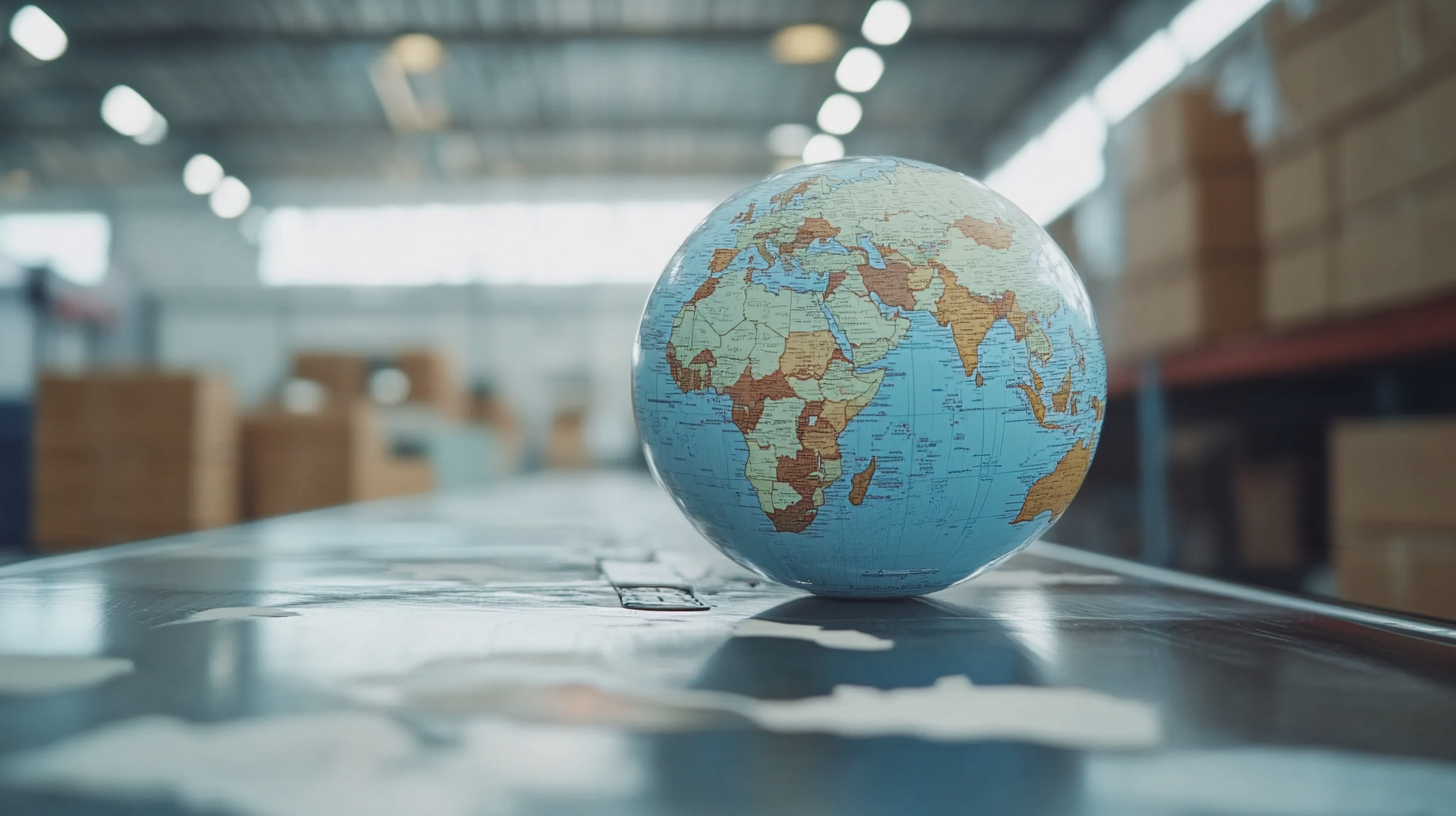Navigating Global Trade Standards for Coffee Service Products
Regardless of the ever-changing situations in global trading, the coffee service industry remains a special place to be found with its own set of challenges and opportunities. Facing increased demand for good-quality coffee products, players in this sector have to contend with a plethora of different international trade standards of a complicated nature. These standards will affect product quality and safety, but they also control how coffee service products are marketed, distributed, and consumed from country to country. Keeping abreast of these regulations is necessary for ensuring compliance as well as ensuring that one can maintain its competitive edge in a crowded marketplace.
The coffee service operation has also got quite a wide variety, going from brewing equipment down to disposable cups; herein lies the difficulty since each is governed by a specific standard which could very well change from region to region. As companies now tend to step out of local markets, they require skills in the identification and application of standards. This blog will look at some global trade standards that affect coffee service products and share suggestions regarding best compliance practices and how to maneuver international trade challenges in this bustling industry.

Understanding the Importance of Global Trade Standards in Coffee Service
International standards are crucial to harmonization in the coffee service products industry and act as the main guarantee for quality, safety, and consistency. The standards generally refer to a variety of specifications and guidelines established by any international organizations for every aspect of trade, from packaging to material safety. It is, therefore, vital for producers, suppliers, and retailers to understand these standards so that they may work around the maze of international trade activities. Compliance with the requirements of global trade standards not only provides an assurance that the company is fulfilling its legal obligations but also bolsters its goodstanding in the marketplace. As such, these standards allow the company to testify to the quality and safety of its products, and that testimony can work wonders in engendering consumer trust and brand loyalty. In addition, understanding these regulations helps to identify and eliminate barriers, thus assisting the company to enter new markets. International trade standards also inspire innovations and improvements with respect to coffee service products. The presence of such standards obliges companies to upgrade their products to meet or exceed such standards not only in terms of product design, sustainability, and customer satisfaction. In a highly competitive market scenario, any company that pursues the global standards will safeguard its interests and contribute toward building a quieter and responsible coffee service industry.

Key International Regulations Impacting Coffee Service Products
This global regulation concern plays a vital role in using important coffee service products by various businesses for propelling their activities into the international marketplace. An International Coffee Organization (ICO) report shows that coffee consumption worldwide was over 166 million bags in the marketing year 2020-2021. Such numbers stress the need for complying with trade standards pertaining to quality, safety, and sustainability of coffee products related products.
Thus, the most significant legislation concerning coffee service products relates to the system of mandatory HACCP, which should apply across regions such as the European Union. As this systematic approach to food safety assists in identifying constituted potential hazards in the manufacturing processes of coffee-related products, it should be adhered to by businesses for the sake of the safety and quality standards. Adoption of GFSI certification is increasingly important, with 81% of food organizations recognizing that GFSI adds value by enhancing consumer trust and brand reputation.
In addition, the multitude of organic certification standards designed by the U.S. Department of Agriculture (USDA) is making a popular score among healthful consumers. According to Organic Trade Association data, organic coffee sales were pegged at $1.5 billion last year: regulatory compliance matters with regard to market opportunities. Hence staying informed and adaptive with the evince change in standards initiated by regulations would be the key aspect for businesses striving to be ahead segments in this competitive market of coffee service products.

Best Practices for Compliance with Coffee Service Standards Worldwide
First, one must meet regulatory as well as compliance protocols in order to navigate the whole set of global trade standards concerning coffee service products. Given the fact that the international coffeemarket will be worth around $30 billion by 2025, the standards become increasingly important for making sure businesses are able to survive within this environment. Recent reports from the International Coffee Organization state that product safety and quality will have a direct bearing on consumer trust and sales performance. The companies have to adopt best practices that align their products with global standards, as it will differ strikingly in different regions.
One of the important highlights is the conformity to food safety requirements just like the Food and Drug Administration (FDA) in the United States and the European Food Safety Authority (EFSA) in Europe which have already outlined requirements on specifications concerning materials used in coffee service products including limits specified for harmful materials and requirements for appropriate labeling and traceability. By using materials which conform to these safety standards, companies protect themselves from being exposed and consequently save huge costs of recall while building reputation in quality.
Besides safety, now attention has focused on environmental sustainability as an important requirement for compliance concerning coffee service products. A report from the Specialty Coffee Association states that today consumers demand "sustainable and fair" products. Consequently, regulations like Rainforest Alliance and Fair Trade have emerged. Such standards enable compliance both to regulations and the growing trend among more and more members of the public who are becoming eco-conscious. Compelling businesses to infuse sustainability with the process of product development entails that every product that comes out will be compliant and is able to interest ethically conscious consumers.
Thus, businesses in the coffee service industry can put these best practices to work to succeed in the intricate landscape of global trade standards-ready for compliance and consumer acceptance-ready to take a full bite of market potential.

Challenges in Meeting Global Trade Standards for Coffee Industry Stakeholders
The complexity of regulations applicable to global trade presents challenges for coffee sector stakeholders. According to the International Coffee Organization's recent report, the global coffee market is to be valued at $460 billion approximately by 2025. This increases the need to comply with far more complex trade standards and regulations, which can greatly differ from region to region. For many stakeholders with their smallholder farmers and local roasters, understanding such regulations poses a significant challenge, thereby creating barriers towards accessing international markets.
An immediate challenge is the conflicting quality and safety standards imposed by different countries. Chemical and environmental standards have been established by the European Union for coffee imports, consequently laying down the hurdles of complex certification required for producers. A survey conducted by the Specialty Coffee Association states that almost 60% of the coffee importers mentioned the compliance with international standards as a major deterrent for new entrants, especially from developing countries. Aside from this, traceability and sustainability issues have gained prominence with consumers increasingly demanding transparency on where and how their coffee is farmed.
Fluctuating trade regimes, compounded by geopolitical tensions and economic shifts, have complicated matters even further. The World Trade Organization reported in 2023 that changes in tariffs on coffee may deeply impact its price and availability. For stakeholders, good practice and compliance with emerging standards must be on constant vigilance and adaptability. Here, technology and innovation may provide new routes into compliance for the industry to meet global standards of trade while ensuring sustainable growth.
Future Trends in Global Trade Standards for Sustainable Coffee Services
Currently, the coffee industry is at a transformational phase with its sustainable development practices. This puts sustainability at the center of trends for future global trading standards of coffee service products. By 2024, it is expected that the worldwide decaffeinated coffee market will hit an impressive US$15 billion and continue up to $22 billion by 2032. This move for decaffeinated coffee constitutes a compound annual growth rate of 4.8%. This is a growth marker for the widespread awareness of consumers on sustainable issues, thereby pushing more people towards ethically made products.
Now as countries form into the Brotherhood of Nations under initiatives like the Belt and Road into their abode, sustainable coffee service entries become even more available. For example, the country that is popularly known for its ancient rich coffee heritage is Ethiopia. It wants to promote its rich heritage and cash in on various economies that are now forging better ties with countries around the world. Promotion in trade activities not only strengthens conventional markets but also opens up new doors to customers beyond what has been traditionally reached.
Farmers numbering more than 25 million produce more than 80% of the coffee that is consumed globally, and most of it is generated in developing countries where coffee acts as a currency export earner. This underlines the need for establishing strong trade standards for sustainable practices under which producers or consumers alike would be committed to holding high-quality coffee services and keeping their promises of environmental protection. The future of coffee will become more and more intertwined with the sustainability spirit at its core, as the consolidation of these trends happens.
